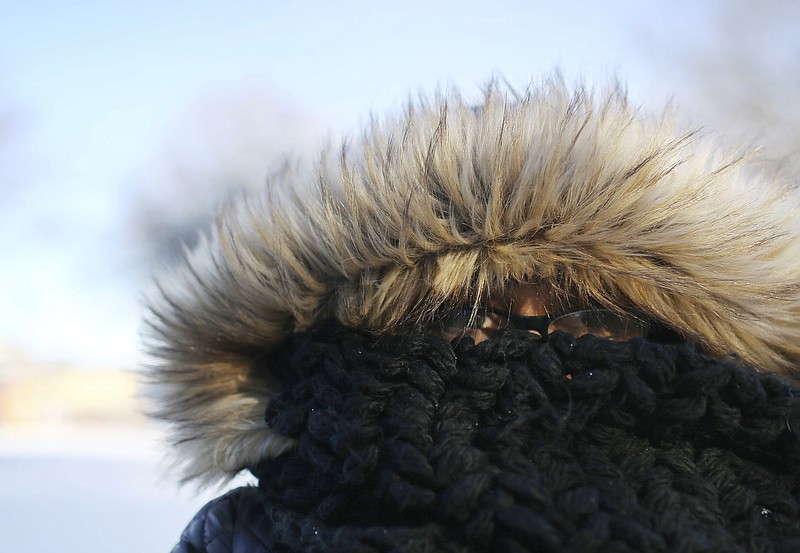Why are weather apps suddenly so bad?
It's not a silly question. A substantial amount of small talk is about weather. More importantly, a substantial amount of industry - especially farming, transportation and energy - is about the weather.
No, we're not going to belabor the mad scramble of deciding and communicating school closings.
At least we've not yet gotten an alert message locally that says a nuclear missile is incoming.
But weather is disrupting, too.
That's why it's important to note often - and today's a good day - that what the Trump administration is doing to science - especially weather, climate and environmental science - is criminal. Possibly even life-threatening.
As rising emissions of greenhouse gases warm the planet and fuel weather extremes of all kinds, scientists warn that Trump and his congressional allies are "deliberately obstructing research," not just on climate change but also about day-to-day weather.
Already we've seen reports of drastically cut environmental protection budgets; the erasures of publicly available data on everything from regulatory violations, violators, sanctions and even the simple words "climate change" from the website of the U.S. Environmental Protection Agency. But the idea-challenged and ethics-numb Trump administration is not backing down.
Last week, the White House formally resubmitted nominations for leaders of both NASA and the National Oceanic and Atmospheric Administration to the Senate.
You might recall that Jim Bridenstine, an Oklahoma Republican congressman, former Navy pilot and climate change denier, is thought by many Congressional Democrats to be completely unqualified to be the administrator of NASA. Meanwhile, Accuweather's Barry Myers, Trump's pick to head NOAA, also has been a controversial nominee from the start, opposed by Obama and Clinton-era NOAA administrators and by the union of the National Weather Service.
A primary concern is Myers's connections to AccuWeather, a private company that could benefit from insider information available to Myers at NOAA. Myers said he would step away and sell his Accuweather shares and options if he got the NOAA job.
Accuweather, which competes with other weather-related companies both as a forecaster and an app maker, depends on NOAA data, so what could possibly go wrong if Myers is put in charge of the government's weather candy store? What's more, Myers cannot possibly extricate himself enough from Accuweather, which is his family's business.
FiveThirtyEight.com reports that, according to publicly available information, 11 members of Myers's extended family are either currently or were previously employed by AccuWeather. Another family member leads multiple companies that appear to have done business with AccuWeather, and two others are executives in a different company that has close ties to AccuWeather.
Then there is the matter of weather science funding - an endangered species under Trump's science-deprived budget.
That plan slashes more than half of the funding for NOAA's ocean and atmospheric research, eliminating scores of research projects, including the agency's long-running, $73-million Sea Grant program, which supports 33 U.S. colleges and universities that conduct research, education and training on ocean and coastal topics. At the same time, the administration's budget for NASA is shifting that agency's focus to "deep-space exploration rather than Earth-centric research." In short, anything having to do with climate study is being axed.
Office of Management and Budget Director Mick Mulvaney last year told national reporters about the cuts to climate research: "We're not spending money on that any more," he said. "We consider that to be a waste of your money to go out and do that."
Even seventh-graders understand that ocean temperatures, currents and tides contribute to how the wind blows and how storms form. But Trump says he doesn't like to read, and apparently his science and budget advisers don't either.
Of course, we also are not spending on the existing National Weather Service's workforce. In October, after the onslaught of devastating hurricanes and wildfires that helped make 2017 the most costly ever for extreme weather, the National Weather Service's cadre of meteorologists was spread razor thin, with hundreds of vacant forecast positions.
There's also the matter of existing weather and climate research infrastructure crumbling - and being destroyed.
Last fall, The Guardian reported that a key polar satellite had broken down, leaving the U.S. with only three aging polar satellites, each operating long past its shelf life, to measure the Arctic's dwindling ice cap.
Earlier in the year, Congress, under control of Republicans antagonistic to climate research, insisted a backup sea-ice satellite - the one that would have replaced the broken eye in the sky - be dismantled because the budget-cutters did not want to provide funds to keep it in storage.
Scientists said there is no chance a new one could be launched until 2023 or later. By then, none of the current aging satellites will still be in operation.
Is it any wonder that our weather apps - and warning systems - don't work?
You can't make this stuff up.
